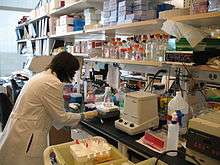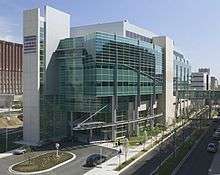University of Chicago Comprehensive Cancer Center
The University of Chicago Medicine Comprehensive Cancer Center is a collaborative cancer research center based in Hyde Park, Chicago, United States. The Comprehensive Cancer Center is committed to exploring and developing innovative ways to prevent and reduce cancer's devastating effects through a collaborative research program involving 210 renowned scientists and physician scientists at or affiliated with the University of Chicago.[1]
History

The Comprehensive Cancer Center was originally founded in 1973 as The University of Chicago Cancer Research Center, and, after earning its Comprehensive Cancer Center designation,[2] was renamed The University of Chicago Medicine Comprehensive Cancer Center.
The Comprehensive Cancer Center is one of 45 comprehensive cancer centers in the United States as designated by the National Cancer Institute[3] of the National Institutes of Health. In 2010, U.S. News & World Report once again gave the UChicago cancer program high marks, ranking it #15 in the nation.[4]
The first cancer research center director was John Ultmann whose specialty was the diagnosis, staging and treatment of Hodgkin's disease and non-Hodgkin's lymphoma, as well as the development of cancer chemotherapy.[5] Currently, the director is Michelle Le Beau[6] who accepted the position in 2004. Le Beau launched and implemented a strategic plan that helped the Comprehensive Cancer Center expand the scope of its research programs, as well as launch a comprehensive community engagement program to enhance public awareness about cancer prevention, detection, treatment, and the role of genetics in cancer risk. Le Beau's work has been in therapy-related cancers.
Scientific programs

Comprehensive Cancer Center investigators are organized into six integrated scientific programs that take advantage of resources throughout the university, the University of Chicago Medical Center, and other scientific and medical communities:
- Program 1: Molecular Mechanisms of Cancer
- Program 2: Hematopoiesis and Hematological Malignancies
- Program 3: Immunology and Cancer
- Program 4: Pharmacogenomics and Experimental Therapeutics
- Program 5: Advanced Imaging
- Program 6: Cancer Risk and Prevention
Clinical trials
The Comprehensive Cancer Center is currently involved in more than 300 cancer clinical trials[7] and encourages participation in the clinical trials by community oncologists and minority populations through a network of affiliated hospitals. Researchers also strive to eliminate health disparities among ethnic and social groups that compose areas surrounding the UChicago campus.
Accomplishments
The University of Chicago has been the site of extraordinary breakthroughs. Scientists are proving that transforming breakthroughs in prevention will originate from the newfound understanding of the human genome. Using systems-level science to decipher the interplay among vast networks of genes, the environment, and other factors will enable researchers to map the causes of cancer, predict cancer risks for individuals, and design personalized treatment approaches.
UChicago accomplishments include landmark prostate cancer treatment in 1939, the identification of the first chromosomal abnormality in leukemia in 1972, the 1988 discovery of the molecular mechanism by which tamoxifen blocks the effects of estrogen, and the 2008 development of a new MRI procedure that can detect early breast cancer.[8]
References
- ↑ http://cancer.uchicago.edu
- ↑ http://www.uchospitals.edu/news/1998/19980428-uccrc-comp.html
- ↑ http://cancercenters.cancer.gov/cancer_centers/cancer-centers-list.html
- ↑ http://health.usnews.com/best-hospitals/university-of-chicago-medical-center-6431210
- ↑ http://www.uchospitals.edu/news/2000/20001024-ultmann.html
- ↑ http://biomed.uchicago.edu/common/faculty/lebeau.html
- ↑ http://clinicaltrials.uccrc.org/
- ↑ http://cancer.uchicago.edu/about/timeline.shtml
